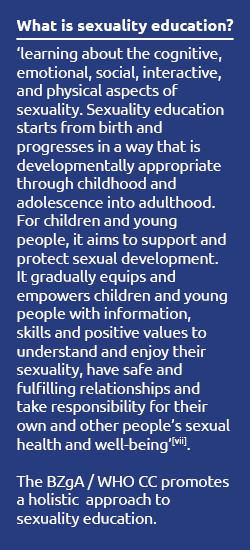Achievements of the German Federal Centre for Health Education (BZgA)’s work as WHO Collaborating Centre for Sexual and Reproductive Health
The WHO Collaborating Centre for Sexual and Reproductive Health, established in 2003 at BZgA has been examining the standards and norms for sexuality education across the WHO European Region. It has published a number of reference documents which define standards for sexuality education, provide guidance for implementation and support the implementation of training programmes for educators. Recent publications include a comparative study of sexuality education in different countries, and a series of policy briefs explaining the benefits of school-based sexuality education.
By Nathalie Bélorgey

The year, 2018, marks the 10th anniversary of the European Expert Group on Sexuality Education and thus provides the opportunity to take a closer look at the milestones and latest results of the work accomplished within the WHO Collaborating Centre at BZgA.

With the first meeting of the European Expert Group on Sexuality Education in late 2008 a process of developing standards for sexuality education for the entire WHO European Region was launched. At that time, huge differences in the coverage, content, and quality of sexuality education within the region, which covers a vast geographical area and variety of countries, had become apparent. Many, mostly western European countries, had national guidelines or minimum standards for sexuality education, but no attempt had been made to recommend standards at the European Union or the WHO European Region level. The envisaged document about standards for sexuality education was thus intended as a first step in filling this gap for the entire region.

Due to high demand, the Standards and the Guidance have been translated into several languages and become an internationally recognised reference instrument for the development of high-quality sexuality education in the region. They have been used in at least 14 countries to develop or adapt curricula for sexuality education and/or for advocacy towards decision-makers.

In December 2017 the WHO Collaborating Centre released a framework document to provide support for and facilitate the implementation of training programmes for sexuality educators, or to improve the quality of existing programmes. This is a continuation of the work started with the development of the Standards and acknowledges the fact that competencies and training of sexuality educators (incl. teachers) are key factors influencing the quality and acceptance of sexuality education.
At present, the scope and quality of training of sexuality educators varies widely across the region. Of 25 countries surveyed, only a handful have integrated training in sexuality education into teachers’ training curricula. In most other countries, training only takes place through specific in-service training courses, which often cover only a limited number of teachers. In general, there is still an important need to strengthen and improve training of educators in sexuality education.
The new framework Training Matters[iii] provides answers to three main questions: it demonstrates why training for sexuality educators is essential for the provision of high-quality sexuality education; it describes what kind of competencies (attitudes/skills/knowledge) sexuality educators should have or develop, and provides examples of training programmes for sexuality educators existing throughout the WHO European Region. The framework document which is currently published in English and Russian will be translated into other languages in 2018.

The provision of sexuality education in school settings is crucial to reach large numbers of children before they become sexually active, while offering an appropriate and safe structure for learning and for support of the healthy development of the pupils.
With a view to facilitating access to short, concise, and evidence-based information about the importance and benefits of (school-based) sexuality education targeted at policy-makers, the media, and advocacy organisations, BZgA started the development of a series of policy briefs dedicated to the topic. This was done within a joint cooperation with the WHO RO Europe and the Regional Office for eastern Europe and central Asia of the United Nations Population Fund (UNFPA EECARO), with involvement of the European Expert Group on Sexuality Education.

New comparative analysis of sexuality education in 25 countries of Europe and Central Asia
In 2016 and 2017 an assessment of sexuality education in Europe and central Asia was undertaken by BZgA in cooperation with the European Network of the International Planned Parenthood Federation (IPPF EN). The analysis covers 25 selected countries of the WHO European Region and provides an overview of the current state and recent developments of sexuality education in the region.

The state of implementation of sexuality education still widely differs between and even within countries of the WHO European Region; however, the assessment undertaken also demonstrates outstanding progress made during the past decade in developing and integrating sexuality education curricula in formal school settings throughout the region. In the majority of the countries surveyed (21 out of 25), there is a clear legal framework for sexuality education in schools; in only four countries of the eastern and south-eastern part of Europe, school-based sexuality education is still virtually absent.
The preliminary results of the study were presented on the occasion of an international conference on sexuality education hosted by BZgA in Berlin in May 2017[v]. The event provided space for an intensive exchange on the trends and the situation of sexuality education in the target countries and for identifying and debating challenges and future strategies related to the implementation and improvement of sexuality education.
The final results of the research study have been detailed in a comprehensive report. The report provides a regional comparative overview of the situation of sexuality education as well as recommendations for its further development. It also presents individual profiles for each country studied. In addition, a series of 26 fact sheets provide an overview of regional and national developments. A Russian version of the documents will also be released during 2018.
With publication of the research results, the WHO CC hopes to trigger a further debate as well as advancements in the coverage and quality of sexuality education in the WHO European Region, while providing useful and potentially transferable examples of interesting practices.
What’s next?
Important steps have been accomplished by the WHO Collaborating Centre of Sexual and Reproductive Health at BZgA in setting the frame and the conditions for the development and extension of high-quality holistic sexuality education in Europe and central Asia.
The WHO CC’s agenda for the coming period include a focus on the situation of vulnerable population groups – especially young people with disabilities – in terms of access to sexuality education. The vision formulated by the 2016 Action Plan for Sexual and Reproductive Health of the WHO RO for Europe[vi] focuses on achieving the full potential of sexual and reproductive health and well-being for all people. This explicitly includes persons with disabilities; the Action Plan defines for them the objectives of establishing mechanisms and promoting tools for the provision of comprehensive sexuality education adapted to their situation.
In line with these aims, the WHO CC will further investigate the situation and needs of young people with disabilities in the WHO European Region as well as promising approaches for these groups. It will also promote the transfer of this knowledge.
References
[i] Based on a legal mandate, the BZgA has been responsible for developing concepts, elaborating and disseminating nationally uniform measures and materials for family planning and sexuality education country-wide since 1992.
[ii] World Health Organization (WHO) Regional Office for Europe and Bundeszentrale für gesundheitliche Aufklärung (BZgA). Standards for Sexuality Education in Europe: A framework for policy makers, educational and health authorities and specialists. Cologne, BZgA, 2010.
[iii] WHO Regional Office for Europe and Federal Centre for Health Education (BZgA). Training matters: A framework for core competencies of sexuality educators. BZgA, Cologne, 2017.
[iv] Policy Briefs 1 to 4: Policy Brief No. 1 “’Sexuality Education: What is it?’ and Policy Brief No. 2 ‘Sexuality Education: What is its impact?’ (in cooperation with the WHO RO for Europe and UNFPA EECARO). Policy Brief No. 3 ‘Introducing Sexuality Education: Key Steps for Advocates in Europe and Central Asia’ and Policy Brief No. 4 ‘Why Should Sexuality Education be Delivered in School-based Settings?’ (in cooperation with UNFPA EECARO).
[v] A documentation of the conference is available under following link: https://www.bzga-whocc.de/en/international-conference-17/documentation/
[vi] WHO Regional Office for Europe. Action Plan for Sexual and Reproductive Health: towards achieving the 2030 Agenda for Sustainable Development in Europe – leaving no one behind. WHO, 2016. Available at: http://www.euro.who.int/__data/assets/pdf_file/0003/322275/Action-plan-sexual-reproductive-health.pdf?ua=1
[vii] See reference of the BZgA-WHO Standards in endnote ii.

Nathalie Bélorgey
Nathalie Bélorgey is a Scientific Project Officer at the unit for international relations of the Federal Centre for Health Education (BZgA), responsible for international cooperation in the area of sexual and reproductive health. She currently coordinates the activities of the WHO Collaborating Centre for Sexual and Reproductive Health.
The Federal Centre for Health Education is a specialist authority in the portfolio of the Federal Ministry of Health established in 1967, responsible for prevention and health promotion at national level. It is located in Cologne, Germany.
Information about activities and publications of the BZgA as WHO Collaborating Centre for Sexual and Reproductive Health are available on following website: https://www.bzga-whocc.de/en/home/
